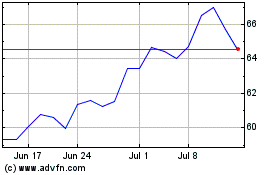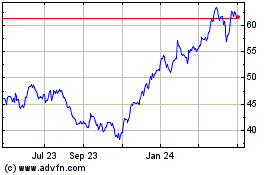By Christina Rexrode and Telis Demos
Citigroup Inc. said Wednesday that its fourth-quarter profit
rose 7%, becoming the latest bank to benefit from volatile
political events that boosted trading. The bank also cut expenses,
and borrower quality improved.
CEO Michael Corbat, who has spent most of his four years on the
job shrinking the bank and putting out fires, is hoping to turn to
a new chapter in which the bank will focus less on drastic measures
to remake itself and more on day-to-day tasks like improving
shareholder returns.
"Restructuring is over," Mr. Corbat said on a call with
analysts. "We will be getting to produce capital returns our
investors expect and deserve."
Citigroup beat analysts' expectations on quarterly profit but
missed on revenue. Shares were down about 1.9% in afternoon
trading.
Last year marked a period when Citigroup was able to stay under
the radar after years of scandals, especially as Wells Fargo &
Co.'s settlement of a sales scandal dominated headlines for the
last four months of the year. Citigroup, meanwhile, passed the
Federal Reserve's stress test and tripled its dividend, and it was
the only bank to pass regulators' exam on living wills on the first
try.
But the bank's shareholder returns have lagged behind. The
company's return on equity, a closely watched profitability metric,
rose to 6.2% from 5.9% in the year-ago quarter, but Citigroup's ROE
trailed the other five big U.S. banks, which posted returns between
7% and 11% for the fourth quarter.
Mr. Corbat on Wednesday laid out new goals for equity returns
and efficiency. The chief financial officer, John Gerspach, said
the bank was "on the right path" to improving shareholder returns,
citing the higher dividend and increased share buybacks over the
past year. A year ago, Citigroup was roughly in line with previous
financial targets that Mr. Corbat had laid out.
"Mike, it seems you've been the most optimistic on this call
than you have, I think, since you started," said Buckingham analyst
James Mitchell.
But Mr. Corbat, more than other bank CEOs, may need to grapple
with what the new presidential administration might mean for his
company. Citigroup's shares have rallied since Donald Trump's
election, largely on the assumption that the new president will
dismantle banking regulations. But the protectionist tone of Mr.
Trump's campaign also has raised concerns about Citigroup's
business model, where a key strategy is moving money around the
world for governments and global businesses. Citigroup has defended
its business strategy, including its investment in Mexico.
On a call with reporters, Mr. Gerspach said it was too early to
tell how policies or sentiments might shake out, but that the bank
was positioned for any scenario and would continue servicing
multinational companies in the U.S. and around the world.
"We've been around for 205 years at this point, we've kind of
seen it all," Mr. Gerspach said. "And we'll deal with whatever
people throw at us."
He also said the bank is still positive on its Mexico business.
"Our views on Mexico are not driven by the fluctuations of the
value of the peso," Mr. Gerspach said. "It's a good franchise for
us."
And if the Trump administration has fueled uncertainty about
what happens next with the banking industry, it has also made
banking clients more optimistic about the economy. Citigroup's
shares have jumped 17% since the election, a bit under the 20% for
the KBW Nasdaq bank index.
Citgroup's fourth-quarter trading revenue, excluding an
accounting adjustment, rose 31% to $3.7 billion from $2.82 billion
a year earlier. That was significantly better than what Mr.
Gerspach predicted last month, when he said he expected trading
revenue to be up by nearly 20% from a year ago. The numbers also
followed strong trading results at rivals, including J.P. Morgan
Chase & Co.'s increase of 24% and Bank of America Corp.'s gain
of 11%.
Citigroup's trading results were driven by a 36% increase in its
larger fixed-income trading unit. Revenue increased 15% in its
smaller equities-trading unit, which the bank has been trying to
expand for years. Investment banking revenue was flat.
Quarterly profit at the New York-based bank was $3.57 billion,
up from $3.34 billion a year earlier. Per-share earnings were
$1.14, higher than the $1.12 expected by analysts.
Revenue fell 8% to $17.01 billion, missing analysts'
expectations of $17.3 billion. However, the decline came from a
drop at Citi Holdings, the unit where the bank stores assets it is
in the process of selling or winding down.
The bank set aside reserves for bad loans at a much smaller pace
than a year ago, when low oil prices raised concerns about defaults
among the banks' energy-related clients.
Quarterly revenue at the consumer bank rose just 2%, with a 10%
drop in Latin America, where the bank has been shrinking its
consumer business.
Revenue increased 15% in branded credit cards in North America,
a unit where the bank has been investing in its Costco Wholesale
Corp. partnership.
Quarterly expenses fell 9%. The bank cut about 5% of its
workforce, to 219,000 from 231,000.
One thing Citigroup will have to do to improve shareholder
returns, including return on equity, is continue the long process
of consuming deferred tax assets. Those assets are credits against
future tax bills, most of which the bank built up during the
financial crisis, but the bank has to hold capital against
them.
At the end of the fourth quarter, those assets were about $46.7
billion, down more than $1 billion over the year.
Write to Christina Rexrode at christina.rexrode@wsj.com and
Telis Demos at telis.demos@wsj.com
(END) Dow Jones Newswires
January 18, 2017 14:58 ET (19:58 GMT)
Copyright (c) 2017 Dow Jones & Company, Inc.
Citigroup (NYSE:C)
Historical Stock Chart
From Mar 2024 to Apr 2024

Citigroup (NYSE:C)
Historical Stock Chart
From Apr 2023 to Apr 2024
